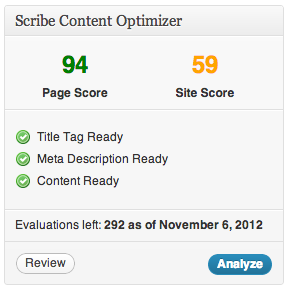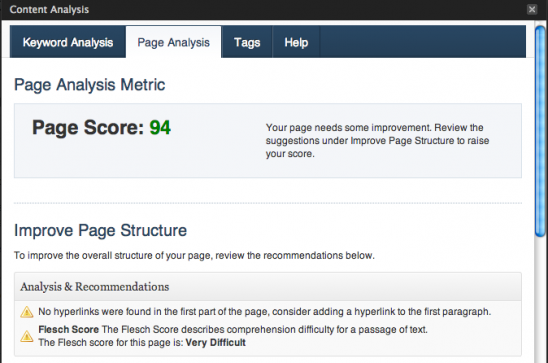Why if fewer people on average visit my newest blog posts on publication day are two things happening:
- My businesses continue to be successful.
- The overall traffic on the WordPress-powered sites I write for are stable or growing.
The answers lie in search engine optimization or SEO. While I’ve been blogging on this site since 2005, it wasn’t until three years ago that I got serious about growing the audience here and on the other sites for which I write. I started with two approaches: an email newsletter promoting the most recent two or three posts and sharing each new post on several social media channels such as Twitter and Facebook.
Before SEO
Email and social sharing proved to be successful at creating spikes in readership on the specific days the promotion was occurring. What I noticed as I became more cognizant of site traffic (or analytics) was that on off days traffic was low or almost non-existent.
It was about this same time I learned about RSS feeds and the ability of some RSS services to convert your feed to an email if that is what the subscriber preferred. I believe RSS is one of the reasons initial day traffic is down for new blog posts. A couple hundred of folks have subscribed to the RSS feed on this site and, when I add those numbers back in, there are actually more people reading new posts today than three years ago.
Bring on the SEO
As I took a closer look at site statistics, I began to see that traffic on the off days was coming from Google (and other search engines). That’s one of the advantages of utilizing WordPress as your blogging platform; the built-in SEO is not half bad. As I reviewed the traffic analytics, I realized I was getting three kinds of traffic on the sites I manage.
Three kinds of traffic you get
Clearly intentioned: These folks have followed a link from social media or found the article via the RSS feed.
Possibly intentioned: They found the site through an Internet search for a key word that matters to your mission. There is a pretty good chance these folks are ones you’d want to become members of your regular audience.
Glad you’re here but I’m not sure how much help we can be to each other: These are people who arrive though Internet searches that are just curiously dropping by to see if the article in question has any value for them. And because I just found my focus this year, some of that traffic is a bit random at the moment.
Fine tuning your SEO
I began to research ways to improve the SEO of each blog post I was writing. I knew about things such as Meta Titles, Meta Descriptions and Keywords; but I wasn’t so sure how to properly optimize them in the WordPress framework. I quickly learned that the theme framework I had chosen for most of my sites included custom fields to manually tweak these key SEO values. I’ve since learned that using theme specific SEO custom fields is not a great idea. It makes it difficult to migrate to another theme in the future. I also have discovered the WordPress SEO plugin by Yoast works with virtually every theme and untethers your SEO from your theme.
The Yoast plugin is good for two groups of folks. If you just want to improve WordPress’s out-of-the-box SEO installation, you can use Yoast and leave all the defaults alone. Or if you are an experienced SEO person, you’ll find Yoast is a huge help in automating some of what you probably used to do manually. If, however, you were somewhere in the middle like I was (trying to learn more about SEO while improving site rankings with search engines), you may want to take another step.
Professional level SEO
 For almost three years, I’ve been making use of the Scribe content marketing software. I’ve written about Scribe before and have even beta tested the last two major releases of the product. So while I am an affiliate marketer for Scribe, I have also been a paying subscriber for almost three years. I’ll warn you up front that Scribe is no longer inexpensive. Starting at $97/month, this is now a tool for those serious about blogging or perhaps running an agency. Despite the expense, the results are amazing.
For almost three years, I’ve been making use of the Scribe content marketing software. I’ve written about Scribe before and have even beta tested the last two major releases of the product. So while I am an affiliate marketer for Scribe, I have also been a paying subscriber for almost three years. I’ll warn you up front that Scribe is no longer inexpensive. Starting at $97/month, this is now a tool for those serious about blogging or perhaps running an agency. Despite the expense, the results are amazing.
Three years into utilizing Scribe, the vast majority of the traffic on this site originates from search engines. So when I’m too busy to properly promote a new post via social media or email, the traffic keeps coming from search. Sure it’s not perfect traffic; but people are still reading and responding either via comments on posts or by filling out the contact form.
The best place to learn about Scribe is their site but here’s my brief overview. I prefer the Scribe WordPlus plugin because I can do my SEO research, analysis and improvement all without having to leave my blog post editing environment. From right within WordPress, you can research keywords related to your topic and then analyze what you’ve written to see what keywords a search engine will pick up. In the newest version of Scribe, you get an analysis (and score) at both the site level and for the specific blog post on which you’re working.
But don’t take my word for it. Go check out the Scribe site where they have plenty of free resources to help you learn more about SEO. You do need to sign up for their email list to get the free ebooks.
Now it’s your turn. What sort of tips and tricks do you have for folks learning the ins and outs of SEO?

Excellent! Great article, I already saved it to my favorite,